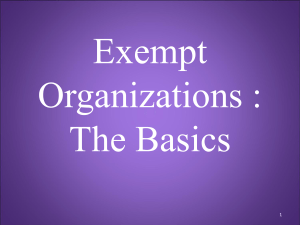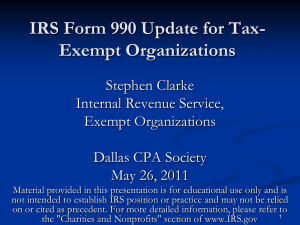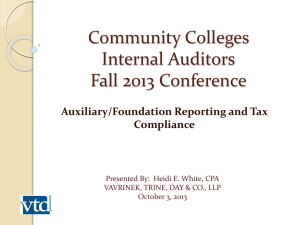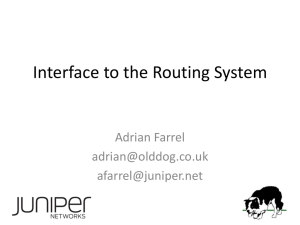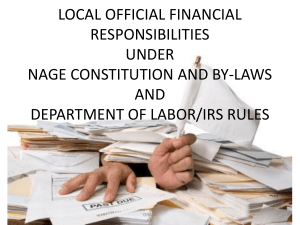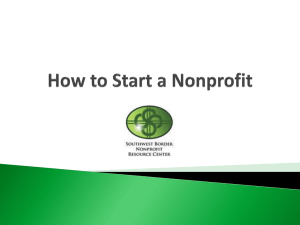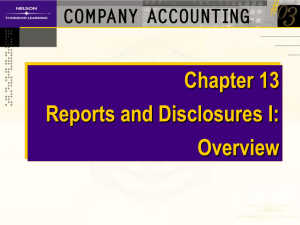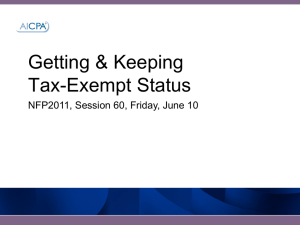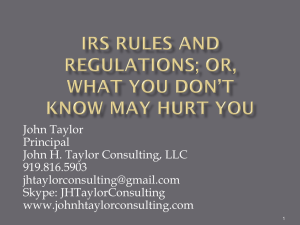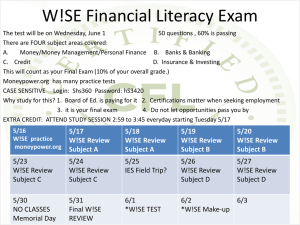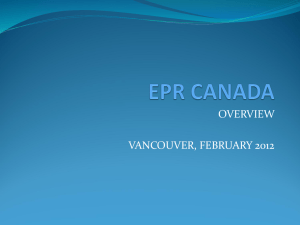Continuing Disclosure Undertakings, EMMA and IRS
advertisement
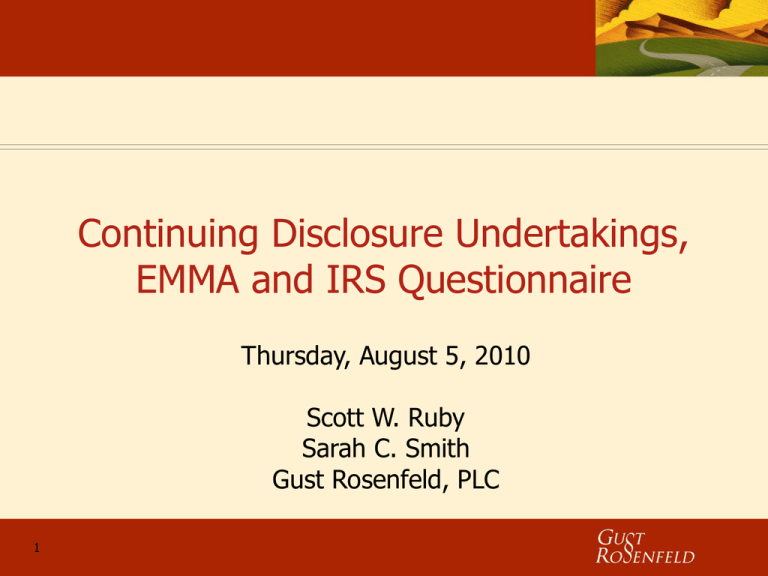
Continuing Disclosure Undertakings, EMMA and IRS Questionnaire Thursday, August 5, 2010 Scott W. Ruby Sarah C. Smith Gust Rosenfeld, PLC 1 S.E.C. Rule 15c-12 The Rule - S.E.C. Rule 15c2-12 Current Rule effective until November 30, 2010 Revisions effective December 1, 2010 2 Rule 15c2-12 - History Before offering municipal securities for purchase, underwriters must ensure that issuers have undertaken into a written agreement to provide continuing disclosure information on an annual periodic basis. 3 Requirement of the Rule for Primary Offerings Issuer has primary responsibility for content of all primary offering documents and continuing disclosure materials, but only as necessary to avoid materially inaccurate or misleading statements. Certification of issuer that preliminary offering statement is complete, i.e., contains all material information except information related to pricing. 4 Requirement of the Rule for Primary Offerings (cont.) Underwriters must undertake a professional review, and in negotiated sales, some investigation to form a reasonable basis that primary offering document is both accurate and complete. Final official statement must be provided within certain time limits and updated until the end of the underwriting period (usually not less than 25 days after closing). 5 Requirements of the Rule for Continuing Disclosure Issuer or obligated person must have undertaken, in a written agreement, to provide certain required information. Written agreement or continuing disclosure contract shall identify each person for whom annual financial information and notice of material events will be provided. The continuing disclosure information is required to be electronically filed with the Municipal Securities Rulemaking Board's Electronic Municipal Market Access ("EMMA") system. 6 Scope of Information Required by Continuing Disclosure The issuer or obligated person is required to provide annual financial information similar to the financial and operating data that is presented in the final official statement. If not submitted as part of the annual financial information, the issuer or obligated person must also provide audited financial statements. 7 List of Event Filings until November 30, 2010 Until November 30, 2010, the issuer must agree to provide notice of any of the following events with respect to the securities being offered: (1) (2) (3) (4) (5) 8 principal and interest payment delinquencies; non-payment related defaults; unscheduled draws on debt service reserves reflecting financial difficulties; unscheduled draws on credit enhancements reflecting financial difficulties; substitution of credit or liquidity providers, or their failure to perform; List of Event Filings until November 30, 2010 (cont.) (6) adverse tax opinions or events effecting the tax-exempt status of the security; (7) modification to rights of security holders; (8) bond calls; (9) defeasances; (10) release, substitution, or sale of property securing repayment of the securities; and (11) rating changes. 9 List of Event Filings beginning December 1, 2010 Beginning December 1, 2010, the issuer must agree to provide notice of any of the following events with respect to the securities being offered in a timely manner not in excess of ten business days after the occurrence of the event: (1) (2) (3) (4) 10 principal and interest payment delinquencies; non-payment related defaults, if material; unscheduled draws on debt service reserves reflecting financial difficulties; unscheduled draws on credit enhancements reflecting financial difficulties; List of Event Filings beginning December 1, 2010 (cont.) (5) substitution of credit or liquidity providers, or their failure to perform; (6) adverse tax opinions, the issuance by the Internal Revenue Service of proposed or final determinations of taxability, Notices of Proposed Issue (IRS Form 5701-TEB) or other material notices or determinations with respect to the tax status of the securities, or other events affecting the tax status of the security; 11 List of Event Filings beginning December 1, 2010 (cont.) (7) modifications to rights of security holders, if material; (8) bond calls, if material, and tender offers; (9) defeasances; (10) release, substitution, or sale of property securing repayment of the securities, if material; (11) rating changes; 12 List of Event Filings beginning December 1, 2010 (cont.) (12) bankruptcy, insolvency, receivership or similar event of the obligated person; Note to paragraph (b)(5)(i)(C)(12): For the purposes of the event identified in subparagraph (b)(5)(i)(C)(12), the event is considered to occur when any of the following occur: the appointment of a receiver, fiscal agent or similar officer for an obligated person in a proceeding under the U.S. Bankruptcy Code or in any other proceeding under state or federal law in which a court or governmental authority has assumed jurisdiction over substantially all of the assets or business of the obligated person, or if such jurisdiction has been assumed by leaving the existing governing body and officials or officers in possession but subject to the supervision and orders of a court or governmental authority, or the entry of an order confirming a plan or reorganization, arrangement or liquidation by a court or governmental authority having supervision or jurisdiction over substantially all of the assets or business of the obligated person; 13 List of Event Filings beginning December 1, 2010 (cont.) (13) the consummation of a merger, consolidation, or acquisition involving an obligated person or the sale of all or substantially all of the assets of the obligated person, other than in the ordinary course of business, the entry into a definitive agreement to undertake such an action or the termination of a definitive agreement relating to any such actions, other than pursuant to its terms, if material; and (14) appointment of a successor or additional trustee or the change of name of a trustee, if material. 14 Annual Financial Information In addition, the issuer must agree to provide in a timely matter notice of a failure to provide annual financial information. Failure to timely file continuing disclosure information must be disclosed in every subsequent offering document for a period of five (5) years. 15 Exemptions All exemptions under the Rule apply to continuing disclosure covenants. The exemptions include: (1) a primary offering of securities in an aggregate principal amount of less than $1,000,000; 16 Exemptions (cont.) (2) securities in authorized denomination of $100,000 or more which satisfy any of the following: (a) are sold to no more than 35 knowledgeable and experienced investors not purchasing with a view to distribute; (b) have a maturity of nine months or less; or (c) may be tendered at the option of the holder at least every nine months. 17 Exemptions (cont.) The Rule provides for an exemption from the annual continuing disclosure undertakings for offerings of small issuers where: (1) at the time of issue no obligated person or the issuer will be an obligated person or issuer of more than $10,000,000 of outstanding municipal securities, including the current offering and offerings under $1,000,000. However, the issuer or obligated person must undertake to provide continuing disclosure of the eleven specified material events. 18 HOW TO USE EMMA 19 20 21 22 23 24 25 26 27 28 29 30 31 32 33 34 35 36 37 38 39 40 41 EMMA AND IRS QUESTIONNAIRE 42 43 44 45 46 47 48 EMMA TRADE ACTIVITY 49 50 51 Information Found on EMMA: - Issuer - Issue name - CUSIP number(s) - Continuing Disclosure Information - Official Statement - Trading information - Initial offering price (Per MSRB, may not be the same as issue price under federal tax law) 52 Definitions – Issue price and De minimus premium Issue price means the first price at which a substantial amount of the bonds is sold to the public. The issue price of bonds for which a bona fide public offering is made is determined as of the sale date based on reasonable expectations regarding the initial public offering price. De minimus premium means (a) ¼ of 1 percent of the stated redemption price at maturity, multiplied by (b) the number of complete years from the bond’s issue date to its maturity date or optional redemption date. 53 IRS Questionnaire 14127 54 IRS QUESTIONNAIRE 14127 55 IRS QUESTIONNAIRE 14127 56 IRS QUESTIONNAIRE 14127 57 IRS QUESTIONNAIRE 14127 58 IRS Questionnaire 14127 & EMMA Specifically written for issuers of Build America Bonds (Direct Pay). However, it is possible that the IRS will send issuers of New CREBs and other types of bonds that the U.S. government is providing a federal subsidy a similar IRS Questionnaire in the future. 59 IRS Questionnaire 14127 & EMMA Ask issuer about specifics of transaction including information about issue price of municipal securities and trading information from sale date (date of obligation/bond purchase agreement with underwriter) and closing date. 60 IRS Questionnaire 14127 and EMMA Are the records of trading activity for your bonds available on EMMA? 61 IRS Questionnaire 14127 & EMMA If sold through a negotiated sale, did any “customers” buy any portion of any issue at a price greater than the initial offering price prior to the delivery of the bonds on the date of issue? If yes, did the underwriter explain why some customers were willing to buy the bonds at a price in excess of the stated initial offering price? 62 IRS Questionnaire 14127 & EMMA A “customer” is defined in MSRB definitional Rule D-8 as “any person other than a broker, dealer or municipal securities dealer acting in its capacity as such or an issuer in transactions involving the sale by the issuer of a new issue of its securities.” 63 IRS Questionnaire 14127 & EMMA The IRS has not given any guidance as to what the issuer can or cannot do if this scenario arises. See IRS Notice 2010-35. 64 IRS Questionnaire 14127 & EMMA Written procedures – not required, but a good idea. We recommend maintaining records for the life of the bonds plus 3 years Designate a Bond Compliance Official 65 IRS Questionnaire 14127 & EMMA IRS Questionnaire asks about these types of written procedures: De minimis premium compliance Expenditures of bond proceeds Timely Available project proceeds Arbitrage yield Cost of issuance (can’t exceed 2% of sale proceeds) Filing IRS forms timely Violations of federal tax requirements 66
